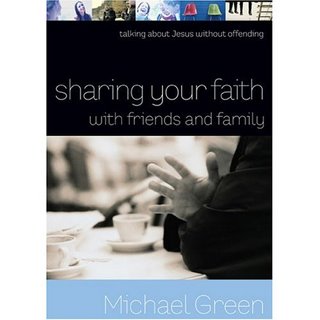sharing your faith with friends and family - Michael Green

I really love this book. It is an easy read (might take low on the go all of one afternoon to polish off), and is scriptural. He opens with a case for the need to be evangelistic (I don't think I need to explain this. The gospels and the book of Acts sum that up pretty well.) He also gives lots of practical ways to "build bridges" between you and the people that you want to minister to and share the gospel with. He claims that chasm between Christian and secular culture is wide but that we must gaurd against thinking that unbelievers are irreligious, immoral, or on the other hand, have tons of good arguments against what you believe. In the following chapters he gives more examples of how to identify with our culture in a way that makes our gospel look like what it actually is: something that is RELEVANT and has been relevant since it was written.
The thing I love about this guy, who is in his 70s or something, is that he sees the need relate to our times without sacrificing our timeless message. He is exactly what the emergent guys should be, but aren't. Like our friend Don Miller, Green stresses the importance of creating a favourable climate for a spiritual conversation to take place. He says people will be most open when they are most at ease. I agree.
He has a few steps to a good approach to a spiritual convo.
1. Speak with modesty. We aren't selling something. We MUST be sensitive.
2. Speak with confidence. Paul said, "I know whom I have believed and I am convinced...ect."
3. Speak with enthusiasm. So many people are unthrilled about their faith. Maybe because all they have is religion but WE have discovered Jesus.
4. Be natural. We need to learn to move on and off the subject of Jesus with ease.
5. Watch the language. We Christians love our lingo. Non-Christians don't love our lingo. Learn to give illustrations that are parallel to their interests or area of study.
6. Timing. He says, "the right thing at the wrong time can be a minor disaster." This is when we need to be close to the Lord. If were are walking close to him, we wont miss his quiet, guiding whispers. We will be more on the ball when he gives us an opening or opportunity.
Here is a good quote for you:
One of the things we need to do if we are to help people to Christ is to puncture the apathy about ultimate issues, the cocoon of surface happiness with which our friends tend to protect themselves.
Then next few chapters are about the process of leading someone to make the decision and how to follow them up. In one of the final chapters he touches on the mistakes that we can make in evangelism and shows how to avoid them. It is all great stuff that is backed by his 50 odd years of experience and scriptural mindset.
The thing I love about this guy, who is in his 70s or something, is that he sees the need relate to our times without sacrificing our timeless message. He is exactly what the emergent guys should be, but aren't. Like our friend Don Miller, Green stresses the importance of creating a favourable climate for a spiritual conversation to take place. He says people will be most open when they are most at ease. I agree.
He has a few steps to a good approach to a spiritual convo.
1. Speak with modesty. We aren't selling something. We MUST be sensitive.
2. Speak with confidence. Paul said, "I know whom I have believed and I am convinced...ect."
3. Speak with enthusiasm. So many people are unthrilled about their faith. Maybe because all they have is religion but WE have discovered Jesus.
4. Be natural. We need to learn to move on and off the subject of Jesus with ease.
5. Watch the language. We Christians love our lingo. Non-Christians don't love our lingo. Learn to give illustrations that are parallel to their interests or area of study.
6. Timing. He says, "the right thing at the wrong time can be a minor disaster." This is when we need to be close to the Lord. If were are walking close to him, we wont miss his quiet, guiding whispers. We will be more on the ball when he gives us an opening or opportunity.
Here is a good quote for you:
One of the things we need to do if we are to help people to Christ is to puncture the apathy about ultimate issues, the cocoon of surface happiness with which our friends tend to protect themselves.
Then next few chapters are about the process of leading someone to make the decision and how to follow them up. In one of the final chapters he touches on the mistakes that we can make in evangelism and shows how to avoid them. It is all great stuff that is backed by his 50 odd years of experience and scriptural mindset.



